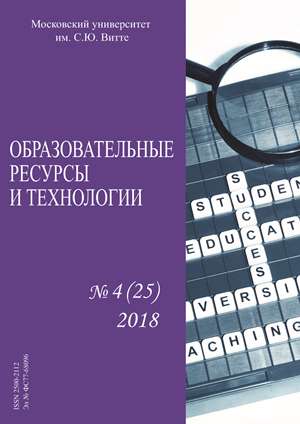Release: 2018-4 (25)

Rubrics:
Educational environment
Content:
DOI: 10.21777/2500-2112-2018-4-7-12
Keywords: course-building, module, module structure, culture of speech, philology, linguistics
Annotation: The article aims at analyzing opportunities of perfecting teaching humanities in non-humanitarian universities based on example of the Russian language. For this purpose the following objectives are reached: efficiency through the prisms of humanities is tackled; potential of such disciplines is revealed; module content structure is proved. The method of research is componential linguo-pedagogical analysis that reveals the specificity of linguistic knowledge, its interdisciplinary ties and potential opportunities of it being used for perfecting educational process.
INFLUENCE OF ANXIETY ON THE CONFLICT BEHAVIOR
DOI: 10.21777/2500-2112-2018-4-13-22
Keywords: anxiety, conflict, interpersonal conflict, conflict
Annotation: The article analyzes the causes of conflict in an educational institution, as well as a sense of anxiety as a factor in the escalation of conflict behavior. The relationship between upbringing and accumulation of anxiety is described. Features of anxious children are brought. The conclusion is made about the connection of anxiety and the suppressing system of education in conflict situations in an educational institution.
THE INFLUENCE OF PEDAGOGICAL CONDITIONS ON THE PROCESS
DOI: 10.21777/2500-2112-2018-4-23-28
Keywords: strategic competence, pedagogical conditions, communicative activity, pedagogical framework, learning environment,the organizational-pedagogical conditions, psychological-pedagogical conditions, didactic conditions
Annotation: Strategic competency and its role in formation of students’ readiness for foreign communicative activity is one of the most important conditions of effective foreign training of non-linguistic students for successful intercultural communication. It is important as to be able to practice effective interpersonal and intercultural communication, which is considered as the basic result of high education, a modern specialist must have a sum of linguistic, cross-cultural and etiquette knowledge as well as be able to choose definite linguistic clichés which are appropriate for the communicative situation. A graduate must also be able to react to unexpected turnings of the conversation, must know how to choose the adequate line of communicative behavior and how to avoid from some possible problems, which can obstruct effective interaction of partners in communication. However, to make such communicative activity possible, strategic competence must be considered as students’ and graduates’ functional feature. Thus, the purpose of this article is to analyze the pedagogical conditions considered as one of the components of a pedagogical framework. The main problems the author deals with are: to analyze and classify the phenomenon of pedagogical conditions; to emphasize and describe the pedagogical conditions which may have a positive impact on the process of formation of students’ strategic competence; to define the key features of pedagogical conditions which determine the process of formation of the strategic competence while studying foreign languages at non-linguistic university. The solution of the problems was carried out with the help of general scientific methods, such as analysis and synthesis as well as description and modeling. As a result of the research the author introduces an author’s model of the complex of pedagogical conditions which promote the formation of non-linguistic students’ strategic competence.
